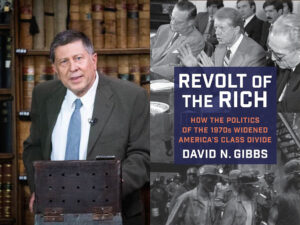The Decline Of The U.S. Empire: Where Is It Taking Us All?

Richard D. Wolff
09-09-2024 ~ The evidence suggests that empires often react to periods of their own decline by over-extending their coping mechanisms. Military actions, infrastructure problems, and social welfare demands may then combine or clash, accumulating costs and backlash effects that the declining empire cannot manage. Policies aimed to strengthen empire—and that once did—now undermine it. Contemporary social changes inside and outside the empire can reinforce, slow, or reverse the decline. However, when decline leads leaders to deny its existence, it can become self-accelerating. In empires’ early years, leaders and the led may repress those among them who stress or merely even mention decline. Social problems may likewise be denied, minimized, or, if admitted, blamed on convenient scapegoats—immigrants, foreign powers, or ethnic minorities—rather than linked to imperial decline.
The U.S. empire, audaciously proclaimed by the Monroe Doctrine soon after two independence wars won against Britain, grew across the 19th and 20th centuries, and peaked during the decades between 1945 and 2010. The rise of the U.S. empire overlapped with the decline of the British empire. The Soviet Union represented limited political and military challenges, but never any serious economic competition or threat. The Cold War was a lopsided contest whose outcome was programmed in from its beginning. All of the U.S. empire’s potential economic competitors or threats were devastated by World War II. The following years found Europe losing its colonies. The unique global position of the United States then, with its disproportional position in world trade and investment, was anomalous and likely unsustainable. An attitude of denial at the time that decline was all but certain morphed only too readily into the attitude of denial now that the decline is well underway.
The United States could not prevail militarily over all of Korea in its 1950–53 war there. The United States lost its subsequent wars in Vietnam, Afghanistan, and Iraq. The NATO alliance was insufficient to alter any of those outcomes. U.S. military and financial support for Ukraine and the massive United States and NATO sanctions war against Russia are failures to date and are likely to remain so. U.S. sanctions programs against Cuba, Iran, and China have failed too. Meanwhile, the BRICS alliance counteracts U.S. policies to protect its empire, including its sanctions warfare, with increasing effectiveness. Read more
Keys To Building Human Bridges To The Past

Deborah Barsky
09–7-2024 ~ Human technologies have continued to evolve exponentially since the end of the Paleolithic: today we are using them to learn more about the past.
Scientific breakthroughs about human origins have captured the curiosity of audiences eager to learn more about the past. We are entering a new phase, thanks to the accumulation of evidence and new research technologies, in which experts and audiences are increasingly asking bigger questions about who we are and where we came from—and are teasing out some valuable answers.
This development has come at a time when there is a growing sense that linking the past with the present can support the attempt to build a more sustainable future.
Groundbreaking technologies are being applied to archeology. Modern archeologists are taking advantage of digital tools to share knowledge about human origins on a widening spectrum of platforms, including museum exhibits, virtual settings, and on-site experiences.
There is, however, a choke point in this process. The academic findings are described in a highly technical language that requires familiarity with the jargon of many research disciplines and testing methods, making the wider public adoption of research from human evolutionary science and archeology difficult. And most experts from these fields are not sufficiently trained to translate their findings to the array of audiences that can use them. But a growing number of initiatives are providing new ways to bridge the gap separating academia from global public awareness, emerging often from leading research institutions in Australia, East Africa, Western Europe, and the U.S. These centers and the educational efforts emerging from them nurture the evolutionary consciousness people need to appreciate what it means to be human.
Fostering knowledge about chains of events that affected the human evolutionary pathway thousands and even millions of years ago allows us to fit them into a coherent, multilevel chronological, and cultural framework. We can train our minds to reflect over long periods and find useful ways to compare chapters of human history. This fundamental viewpoint will permit the kind of planning necessary for solving long-term human challenges, from social to environmental. Read more
Robert Sapolsky: Are We Better Off Accepting That There’s No Free Will?
 09-06-2024 ~ Interviewing the neuroscientist and primate behavior expert on a question that could radically change our understanding of reality.
09-06-2024 ~ Interviewing the neuroscientist and primate behavior expert on a question that could radically change our understanding of reality.
The release of Determined, a new book by renowned Stanford professor of primate behavior and neuroscience Robert M. Sapolsky, has catapulted him into the middle of an ancient debate: whether humans have free will and agency over their actions. Determined isn’t just a bio-philosophical treatise: It covers the potential benefits that a society that accepts Sapolsky’s thesis of there being zero free will and agency over our actions will likely become more humane and will be better at understanding and addressing humanity’s challenges.
Sapolsky found fame while teaching the science of stress and anxiety from a neurological perspective and its presence in the wider primate world. His popular teachings have enlightened millions and opened new pathways to help people consider the biological causes of their behavior.
Over this year, Sapolsky has rolled a publicity tour in defense of Determined’sthesis, including speaking on dozens of nationally known podcasts, and more recently, he has co-launched an informative and witty YouTube Q&A show with his talented daughter Rachel Share-Sapolsky.
We reached out to Sapolsky for an interview about his thinking on how public adoption of science can change perspectives, and his experience as an activist to try and get the world to think differently about the causes of human behavior.
Jan Ritch-Frel and Marjorie Hecht: You point to the early 1800s in France as a turning point in how society perceived epilepsy, from culpability for behavior during seizures to understanding it as a medical condition. Where are you seeing similar green shoots today?
Robert Sapolsky: A great example is the recognition that obesity is a biological disorder, rather than some sort of failure of Calvinist self-discipline. It is a biological disorder that is profoundly sensitive to psychological state and social context, but it is nonetheless biological.
To give the most dramatic example, if someone has a mutation in the leptin receptor gene, their brain will simply not process food satiation signals, regardless of how much willpower they have. Currently, stigma about weight is one of the most persistent prejudices in society, and findings like this are just beginning to change attitudes toward obesity. Read more
Political Collapse: Lessons From Fallen Empires
 09-04-2024 ~ Our investigation of the disastrous society-wide collapses of four premodern polities, China’s Ming Dynasty, the South Asian Mughal Empire, the High Roman Empire, and Renaissance Venice led to the discovery of an unexpected historical pattern. This revelation was not evident before these sudden collapses as all four polities had demonstrated forms of governance that persisted for centuries, had been among the wealthiest and best-governed polities of their eras, and had embraced policies fostering inclusiveness and egalitarianism that engendered strong support from the majority of their citizens.
09-04-2024 ~ Our investigation of the disastrous society-wide collapses of four premodern polities, China’s Ming Dynasty, the South Asian Mughal Empire, the High Roman Empire, and Renaissance Venice led to the discovery of an unexpected historical pattern. This revelation was not evident before these sudden collapses as all four polities had demonstrated forms of governance that persisted for centuries, had been among the wealthiest and best-governed polities of their eras, and had embraced policies fostering inclusiveness and egalitarianism that engendered strong support from the majority of their citizens.
We could not identify any exogenous causal factors for the collapses—such as drought, epidemic, or conquest by a more powerful foe (three of the four eventually were conquered, but only after their governments were considerably weakened)—adding to our confusion about what led to these major political transformations.
To understand the reasons for the political breakdowns, we decided to revisit an earlier article in which we had posited an answer to this question when it became increasingly clear to us that the conflictive political culture of the contemporary U.S. presents striking parallels with what we had discovered. We aim to reexamine our article to bring a comparative perspective on historically well-known episodes of collapse, their causes, and negative outcomes, and to alert U.S. citizens of the potential dangers we face, so we can highlight the need to take urgent corrective actions. We begin by referring to recent works by political scientists and anthropologists that provided theoretical context for our arguments.
Collective Action Theory Expands Our Understanding of Governance
In all four instances, collapse followed quickly after the leaders of these polities inexplicably and suddenly abandoned principles and practices that had successfully underpinned state-building and social stability. Their actions initiated a cascading series of events that brought a rapid decline in many aspects of society, which extended beyond the government. But why would the actions of just a few people have such severe consequences for otherwise endurable and well-organized polities? Read more
Neoliberal Policies Associated With Reaganomics Actually Started With Carter

Historian David N. Gibbs ~ University of Arizona
09-03-2024 ~ Historian David N. Gibbs, author of “The Revolt of the Rich,” says we mustn’t whitewash President Carter’s record.
Research has long established strong links between neoliberal policies and increasing rates of inequality. Susan George, for instance, argued quite convincingly that increasing inequality stems from the neoliberal practices of placing public wealth into private hands, enforcing huge tax cuts for the rich and suppressing wages for average workers. And a recent study by psychology researchers shows that neoliberalism has resulted in both preferences and support for greater income inequality. Moreover, the study in question argues that the culprit for the impact on attitudes is “Thatcherism.” Indeed, most researchers place the origins of the neoliberal counterrevolution in the postwar era with the policies initiated by Margaret Thatcher and Ronald Reagan in the U.K. and the U.S., respectively.
However, a new book by the historian David N. Gibbs, titled, The Revolt of the Rich: How the Politics of the 1970s Widened America’s Class Divide, contends that we should look to the administrations of Richard Nixon and Jimmy Carter in particular for setting up the foundations for the launching of the neoliberal counterrevolution in the United States. As such, as its author points out in this exclusive interview for Truthout, too much credit has been assigned to the Thatcher-Reagan duo for the end of the Keynesian social democratic approach to government and economics. As Gibbs says, “We should not whitewash Carter’s record” as he was “certainly no friend to the working class.” Gibbs is professor of history at the University of Arizona. Read more
PVV Blog 11 ~ The Ideology Of The PVV In Practice: Conclusion
 09-02-2024 ~ In this final episode of the series, I conclude my reflections and venture a prediction on how the new government, with its PVV contingent, will fare. The reason for ending the series is twofold. Firstly, I have based this series on my earlier work on the PVV, as expressed in my books De ideologie van de PVV. Het kwade goed en het goede kwaad (2012) and The Dutch Party for Freedom. An Analysis of Geert Wilders’ Thinking on Islam (2012). I noticed that everything I had noted and analyzed in the books regarding the PVV’s ideology had become almost exhausted. In this series, I have extensively discussed the positions and considerations that party leader Wilders and party ideologue Bosma once committed to paper, which I analyzed in both books. Secondly, I notice that all the points I have discussed now also frequently appear in the national and international press. It seems that what I wrote about in 2012 has now become common knowledge in the reporting of the PVV-critical press. And that, of course, gives me much satisfaction. The press is aware of the very poor democratic structure of the PVV; they know of the now more than ever unhidden agenda of the PVV to make the Netherlands, and preferably all of Europe, Islam-free and thus Muslim-free. Of the close relationships the PVV maintains with like-minded individuals in Europe, such as Marine Le Pen of the French Rassemblement National and Hungarian Prime Minister Orbán of the Fidesz party. This series will remain online for the time being, but it will also be published in full on my website and on my Academia page, both in Dutch and English, and perhaps later in French and Arabic as well.
09-02-2024 ~ In this final episode of the series, I conclude my reflections and venture a prediction on how the new government, with its PVV contingent, will fare. The reason for ending the series is twofold. Firstly, I have based this series on my earlier work on the PVV, as expressed in my books De ideologie van de PVV. Het kwade goed en het goede kwaad (2012) and The Dutch Party for Freedom. An Analysis of Geert Wilders’ Thinking on Islam (2012). I noticed that everything I had noted and analyzed in the books regarding the PVV’s ideology had become almost exhausted. In this series, I have extensively discussed the positions and considerations that party leader Wilders and party ideologue Bosma once committed to paper, which I analyzed in both books. Secondly, I notice that all the points I have discussed now also frequently appear in the national and international press. It seems that what I wrote about in 2012 has now become common knowledge in the reporting of the PVV-critical press. And that, of course, gives me much satisfaction. The press is aware of the very poor democratic structure of the PVV; they know of the now more than ever unhidden agenda of the PVV to make the Netherlands, and preferably all of Europe, Islam-free and thus Muslim-free. Of the close relationships the PVV maintains with like-minded individuals in Europe, such as Marine Le Pen of the French Rassemblement National and Hungarian Prime Minister Orbán of the Fidesz party. This series will remain online for the time being, but it will also be published in full on my website and on my Academia page, both in Dutch and English, and perhaps later in French and Arabic as well.
The New Government
The debate on the government declaration on July 3 and 4 already led to a significant clash between the newly minted Prime Minister Dick Schoof and PVV leader Wilders, which I reported on in the previous episode of this blog. The prime minister identified himself in his observations with the later Dutch Olympic champion marathon runner Sifan Hassan, of Ethiopian origin, saying he considered her someone who belongs to society. The prime minister has so far acted inclusively (‘everyone is part of society’), and I have yet to catch him making an ‘exclusive’ statement (‘us versus them’).
Furthermore, the ministers from the PVV are confronted with the daily realities of governance. Minister Agema of Health reported that she could do little or nothing to keep a hospital in Heerlen, in the south of the country, open, even though she repeatedly argued as a Member of Parliament at the time that hospitals should not be closed and that the government should take the necessary measures to prevent this. Read more


